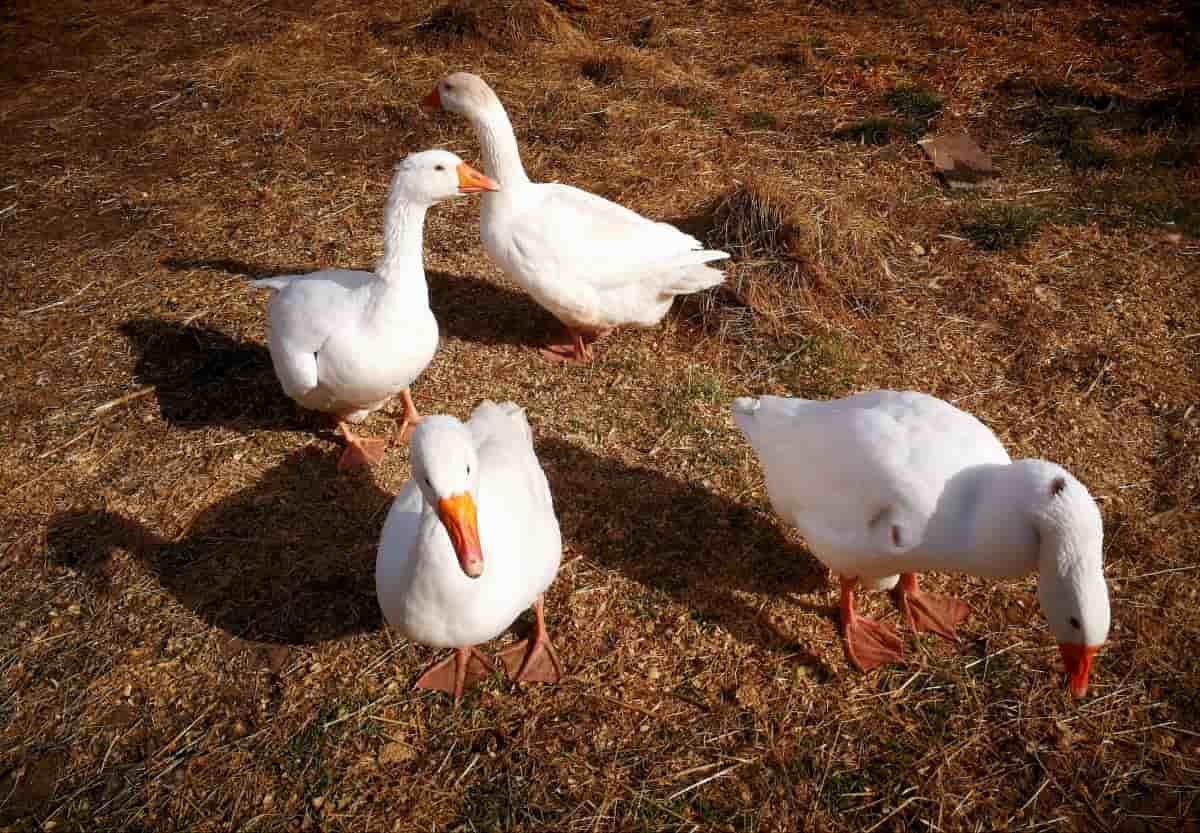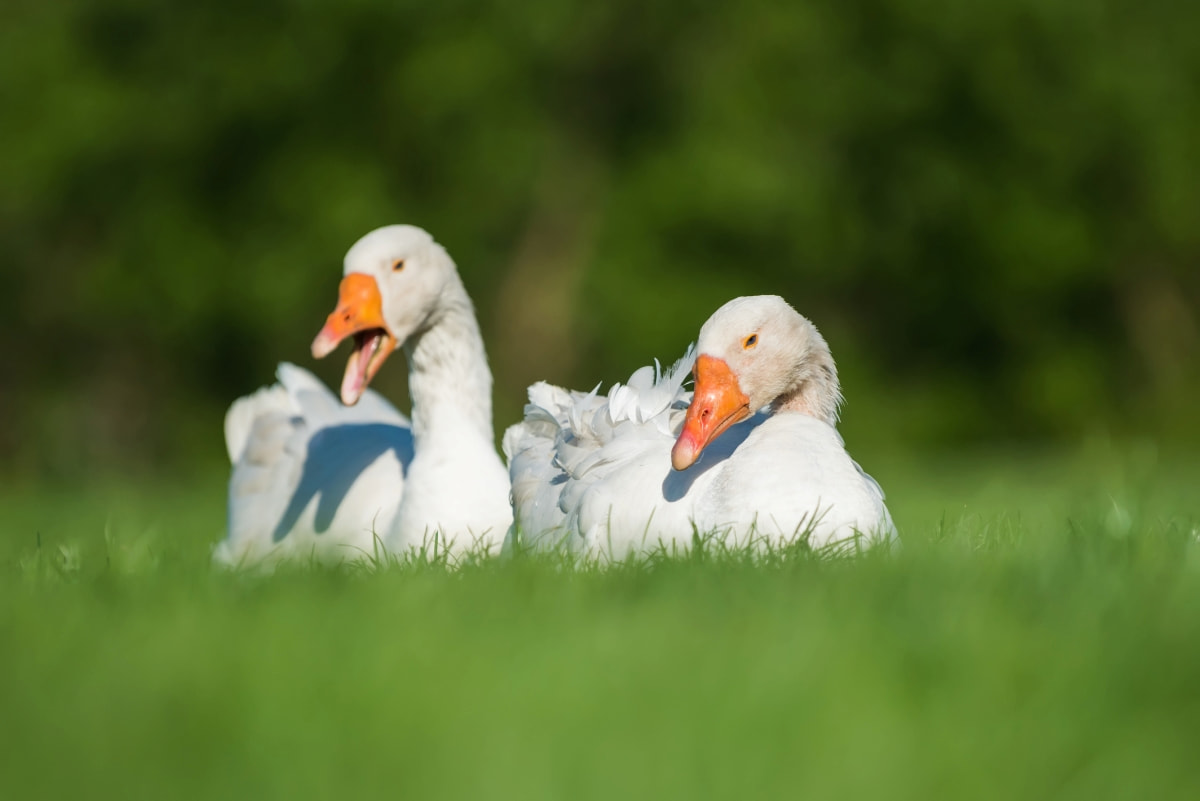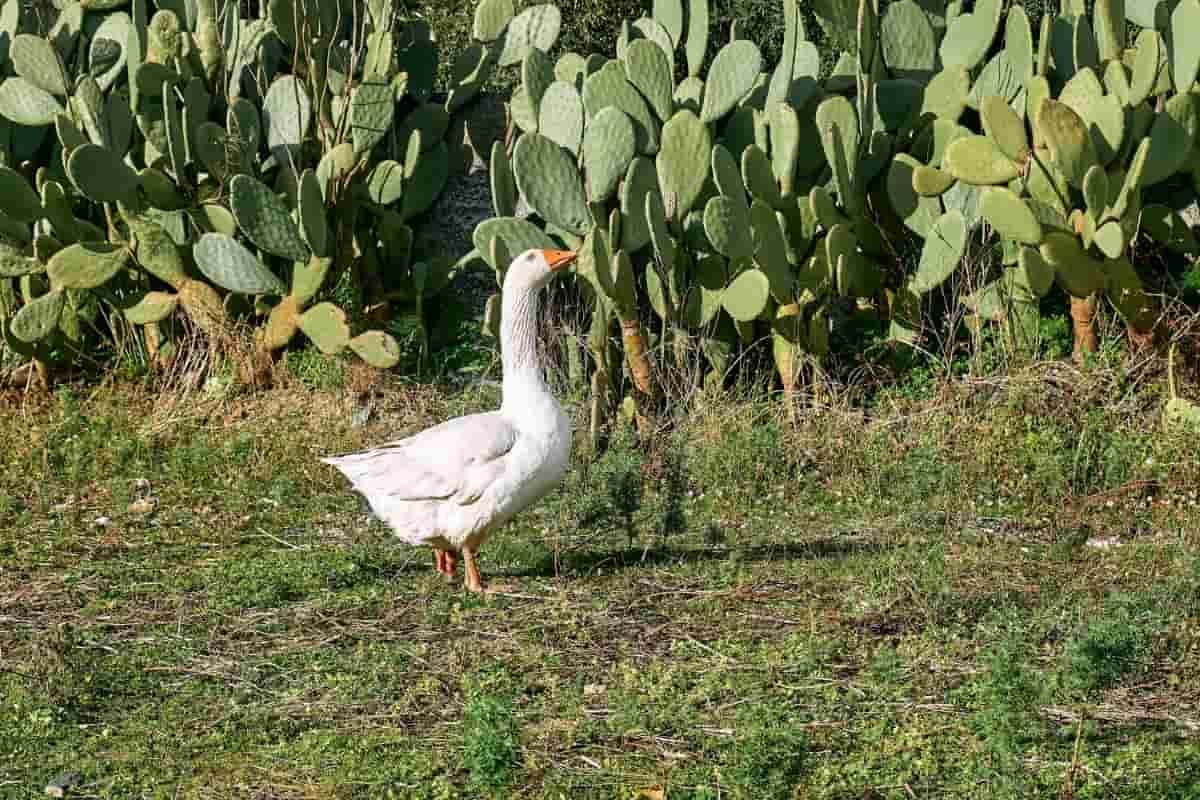The Embden goose breed is a popular and versatile breed with a rich history. Originating in Germany, this breed was developed in the 19th century and is named after the town of Embden. They have a large and robust body, making them an ideal choice for meat production.

In addition to their meat, Embden geese are also valued for their eggs, which are known for their large size and rich flavor. Furthermore, their down feathers are highly sought after for use in pillows and comforters. Overall, the Embden goose breed is a valuable and multipurpose breed that has significantly impacted various industries.
Embden Goose Breed
Physical Appearance and Plumage of Embden Geese
- Size: Embden Geese are large birds. They have a long, sturdy body and strong, straight neck.
- Color: The plumage of Embden Geese is typically white, although some may have a slightly creamy tint. This white coloration extends from their feathers to their beaks, legs, and feet.
- Feathers: Their feathers are thick and dense, providing excellent insulation against cold weather. They are also water-resistant, allowing the geese to swim comfortably.
- Beak: Embden Geese have a medium-length beak that is orange in color. It is strong and slightly curved, enabling the geese to forage for food efficiently.
- Legs and Feet: Their legs are set far back on their bodies, making them well-suited for walking and grazing. The feet are webbed, facilitating swimming and providing stability on various terrains.
- Head and Neck: Embden Geese have a graceful, elongated neck that is held upright. Their head is small in proportion to their body, with a wedge-shaped profile.
- Weight: On average, Embden ganders weigh about 14 kg and goose about 9 kg.
Understanding the Temperament and Behavior of Embden Geese
- Embden geese, a large domesticated breed of goose, are known for their calm and friendly temperament.
- They are highly social animals that enjoy the company of other geese and humans.
- Embden geese are generally docile despite their size and rarely display aggressive behavior.
- They are intelligent. They can be trained easily to follow basic commands and routines.
- The Embden geese are excellent foragers and are known for their ability to feed on a wide range of plants.
- They are also good guardians, instinctively raising the alarm when they sense danger.
- Embden geese are known for their distinctive honking sound, which they use to communicate with each other.
- These geese are generally easy to handle and are often kept as pets, on farms, or in parks and gardens.
Breeding and Reproduction of Embden Geese
Typically breeding season occurs during the spring months when the geese reach maturity. During this time, male geese, called ganders, engage in courtship displays to attract females, known as geese. When a pair forms a bond, they mate, and the female lays eggs. Embden geese are known to be excellent parents, with both the male and female taking turns incubating the eggs. After approximately 28-30 days, the eggs hatch, and the goslings begin their journey to adulthood.
Feeding and Nutrition Requirements for Embden Geese
- These waterfowl require a balanced diet to meet their nutritional needs. A typical diet for Embden geese consists of a combination of grass, grains, and commercial poultry feed.
- It is important to provide them with various food sources to ensure they receive sufficient essential nutrients, such as protein, vitamins, and minerals.
- Fresh, clean water should always be available for drinking and bathing.
- Additionally, providing access to grazing areas and occasional treats, like vegetables or fruits, can help promote their overall health.
- On average, an adult Embden goose consumes around 450 grams of feed per day. This amount may vary depending on age, activity level, and environmental conditions.
- Young geese, known as goslings, require more feed due to their rapid growth. Providing them with 800-1200 grams of feed per day is recommended.
Common Diseases in Embden Geese: Prevention and Treatment
Avian Influenza
- Prevention: Vaccination, strict biosecurity measures, quarantine of new birds.
- Treatment: Supportive care, antiviral medication, and antibiotics for secondary infections.
Gastrointestinal Disorders
- Prevention: Clean and hygienic living conditions, proper diet, regular deworming.
- Treatment: Probiotics, deworming medications, supportive therapy, dietary adjustments.
Respiratory Infections
- Prevention: Good ventilation, regular cleaning of the living area, isolation of sick birds.
- Treatment: Antibiotics, anti-inflammatory medication, supportive care.
Parasitic Infestations
- Prevention: Regular deworming, avoiding contact with infected birds or environments.
- Treatment: Deworming medications, insecticides, and proper hygiene practices.
Footpad Dermatitis
- Prevention: Clean and dry living conditions, avoiding wet and dirty areas.
- Treatment: Cleaning and disinfection of affected areas, topical ointments, and footpad protection.
In case you missed it: Frequently Asked Questions About Duck Farming

Housing and Space Requirements for Embden Geese
Housing and space requirements for Embden geese must be carefully considered to ensure their well-being. These geese are large and active birds, requiring ample space to move around and exercise. A suitable house should have a minimum floor space of 8-10 square feet per bird, with a height of at least 3 feet to allow for comfortable movement.
The house should also provide protection from predators and inclement weather. Additionally, an outdoor enclosure is necessary to allow the geese access to fresh air and grazing. This enclosure should have a minimum of 100 square feet per bird.
When Do Embden Geese Start Laying Eggs
Embden Geese typically start laying eggs between the ages of 6 to 8 months. This geese breed is known for its early maturity compared to other breeds. Once they reach maturity, Embden Geese will lay eggs consistently throughout the year.
Embden Goose Egg Production: Eggs/year, Size, and Color
- Eggs/ Year: On average, a single Embden Goose can produce around 30 to 40 eggs per year. However, this number may vary depending on various factors such as genetics, diet, and environmental conditions.
- Egg Size: When it comes to the size of Embden goose eggs, they are relatively large compared to other poultry eggs. On average, an Embden goose egg weighs around 150 to 200 grams.
- Egg Color: In terms of color, Embden goose eggs have a pure white shell.
Embden Goose Price: Where to Buy Embden Goose?
If you are interested in purchasing Embden geese, there are several options available to you. One option is contacting local farmers or breeders specializing in raising geese. They may have Embden geese available for sale or be able to direct you to someone who does.
In case you missed it: Feed Management in Ducks: Feeding Plan, Feed Formula, and Feed Requirement

Another option is to search online marketplaces and classified ads for sellers offering Embden geese. Additionally, agricultural or poultry shows and fairs often have vendors selling various geese breeds, including Embden geese. On average, the price of an Embden goose ranges from $15 to $25.
Conclusion
In conclusion, the Embden goose breed is highly regarded for its physical characteristics, egg production capabilities, and breeding traits. Whether you are considering raising Embden geese for meat production or simply as an ornamental addition to your flock, understanding their unique characteristics and needs ensures their overall health and success.
- Feed Your Flock for Less: Top 10 Tips to Save on Chicken Feed
- Ultimate Guide to Ossabaw Island Hog: Breeding, Raising, Diet, and Care
- Hatching Answers: The Top 10 Reasons Your Chickens Aren’t Laying Eggs
- Eggs and Economics: Breaking Down the Cost of Raising Backyard Chickens
- Defend Your Greens: Proven Methods to Keep Iguanas Out of Your Garden
- Ultimate Guide to Cinnamon Queen Chicken: A Comprehensive Guide for Beginners
- Ultimate Guide to California Tan Chicken: Breeding, Raising, Diet, Egg-Production and Care
- Ultimate Guide to Marsh Daisy Chicken: Breeding, Raising, Diet, and Care
- 10 Types of Chicken Farming Businesses You Can Start for Profits